Track the hashtag #UncommonCourage and #ClimateCourage to connect on social media. I’ll keep updating this blog, so favorite it and check in often.
Introduction
When it comes to the multiple planetary crisis’s we face, it’s can be a very overwhelming and confusing conversation. No wonder so many are feeling eco-anxiety (resources for eco-anxiety here), because they feel useless in the big fight we face. But more are waking up to the urgency and 2023 is the year of significant momentum – especially when we experience what 1.5C of warming will feel like at the end of this year, early 2024.
In my work sharing on climate and social issues content over many years, I had an epiphany in 2021. And that epiphany is about our power – we the people have power. But to maximize that power, billions of us must commit to changing the way we live and work. We must commit to living more consciously, and in harmony with all life on earth. We need to do it urgently too.
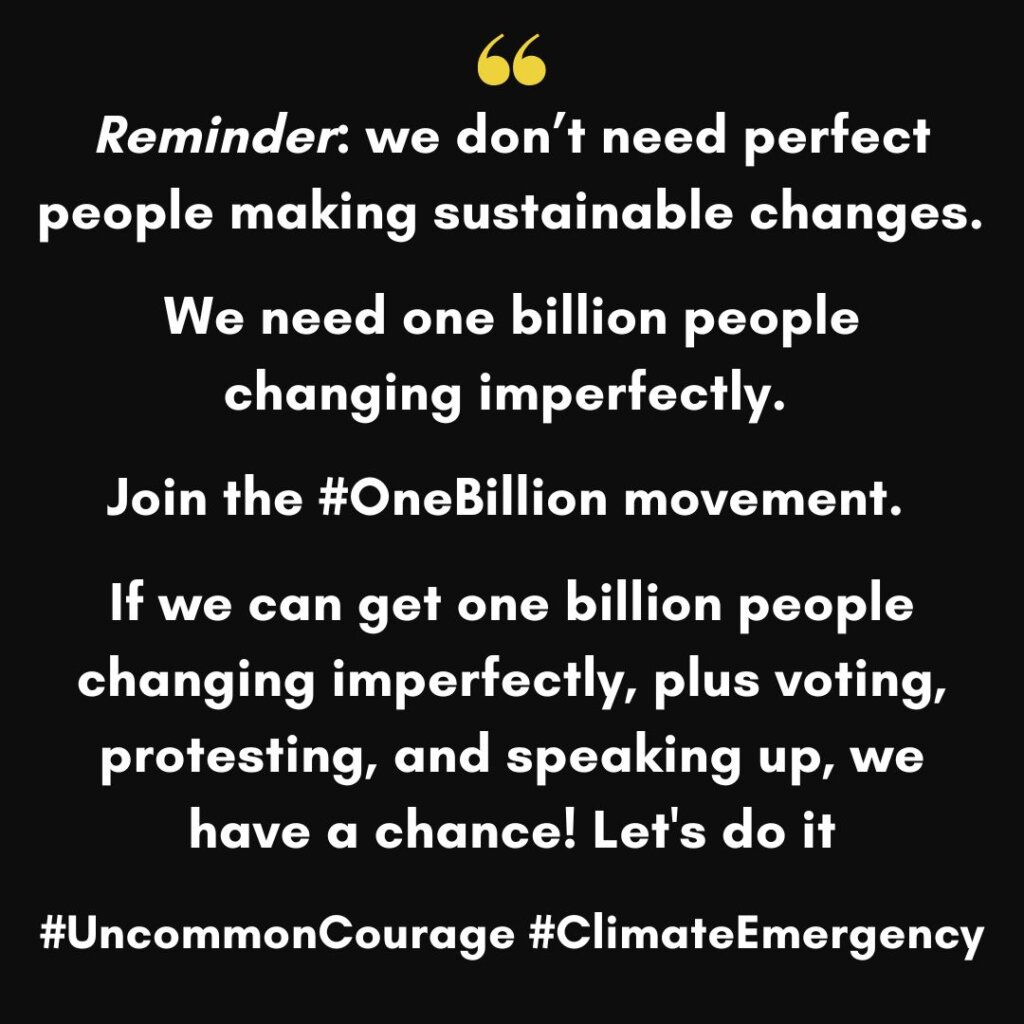
If we do this, the businesses currently taking our money and contributing the most to the planetary crisis, will feel the financial impact. When their customers stop buying, they will have no choice but to change. That is our power. Bottom-up change, and we MUST embrace it!
And when we start changing, who we vote for changes, and when we get our votes right, we can fill our parliaments with people who understand the challenges and commit to working towards overcoming – or at least lessening – the severity. We will support them too, because we’ll know what we need to give up to overcome, or more correctly, lessen the impact, of what lies ahead.
Believe in our power. Change is not happening even remotely fast enough from the top, so we need to drive that change bottom-up. Are you ready to make changes that matter and inspire others to change too? Great, let’s get going.
For as long as it takes – look out for ideas on what we can all do by following #UncommonCourage. Pick one action and get started. Share what you’re doing and inspire others to get on board.
All of the ideas below are on a Padlet board. I encourage you to download and use as your own, use at school, in your community, wherever you think you will have the most impact. We must ripple out and change humanity.
Check out Climate Courage – link to the playlist
Here we go – as they tumbled out
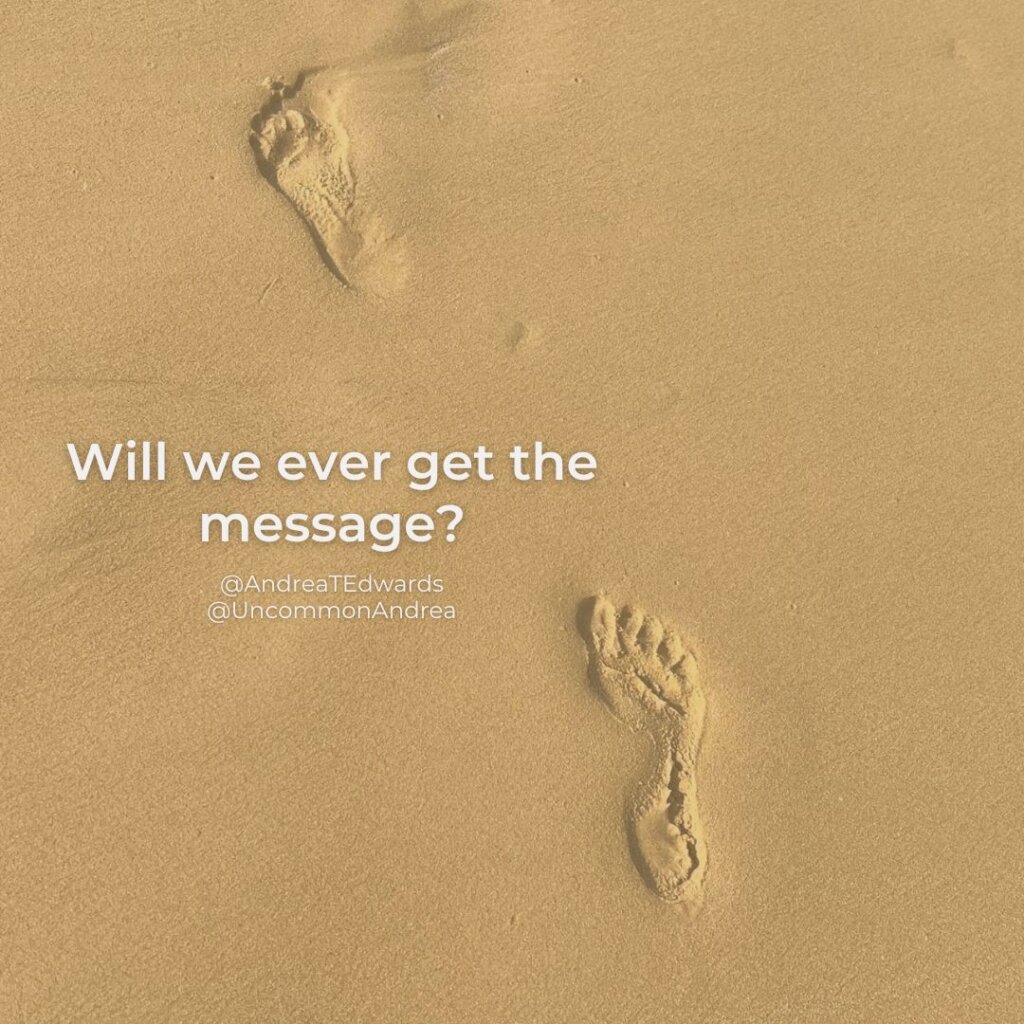
- Hang-dry your clothes instead of using the dryer. If we all did that, the energy and cost reduction would be astounding.
- Be sustainable and stylish – shop vintage or host a community clothing swap.
- Now that many people are working from home full-time due to the pandemic, can you design your workspace around natural light? Tip by Curbed.com
- Adjust your thermostat to run 2 degrees cooler in the winter and 2 degrees warmer in the summer. The energy savings can be dramatic. Tip by Curbed.com
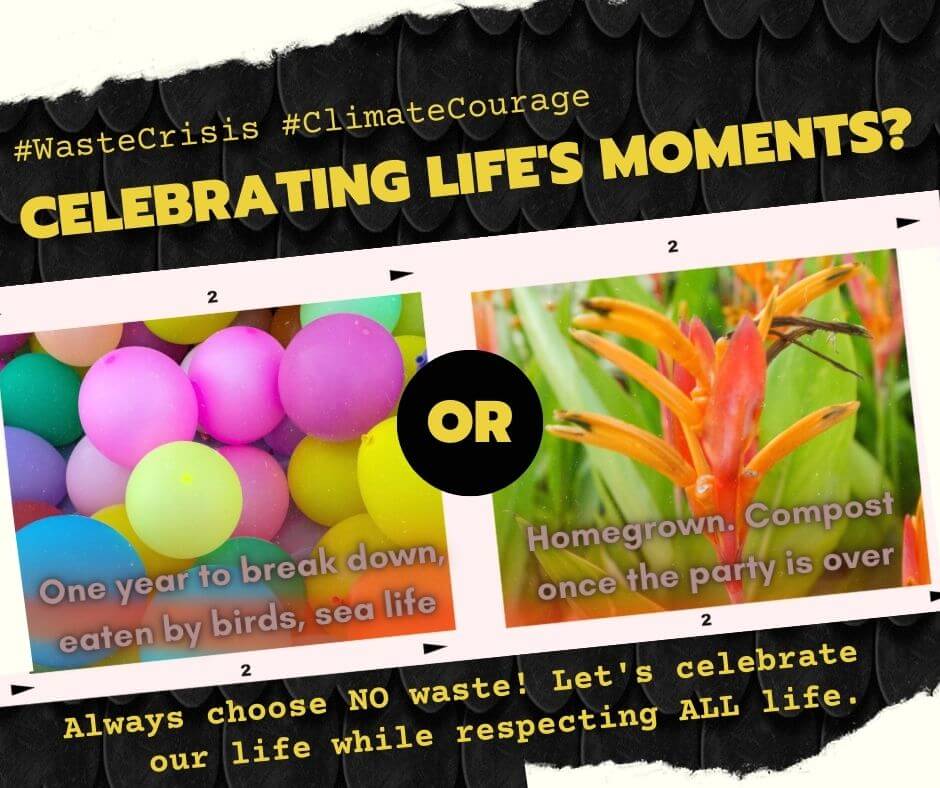
- LED light bulbs last almost 50 times longer than incandescent bulbs. Replace yours today! Not only does it save you money, your home will consume less energy.
- Unplug everything! If you aren’t using it – unplug it! The savings – estimated between 10 and 20% – will show up on your bill.
- Hey you! Turn down the brightness on your computer screen to make the battery last longer and then turn it off and unplug it when it’s not in use.
- Follow the 20-minute rule. If you can walk there in 20-30 minutes then leave the car and walk, pedal or skate.
- Use less paper. Opt for paperless bills or forego the receipt entirely. Use the notes function on your phone for your grocery list instead of paper. Reject paper bags in shops too. Take your own bag every time. Reduce, reduce, reduce!
- Hate the cost of petrol these days? Maintaining your vehicle and being a better driver (slowing down gradually and following speed limits) makes your car more fuel-efficient. Also check for cracks in your gas cap and keep tires properly inflated.
- Connect your kids to the environment around them. Hike. Camp. Wander. Splash. Play. Kids have to love naturebefore they will be inspired to save it.
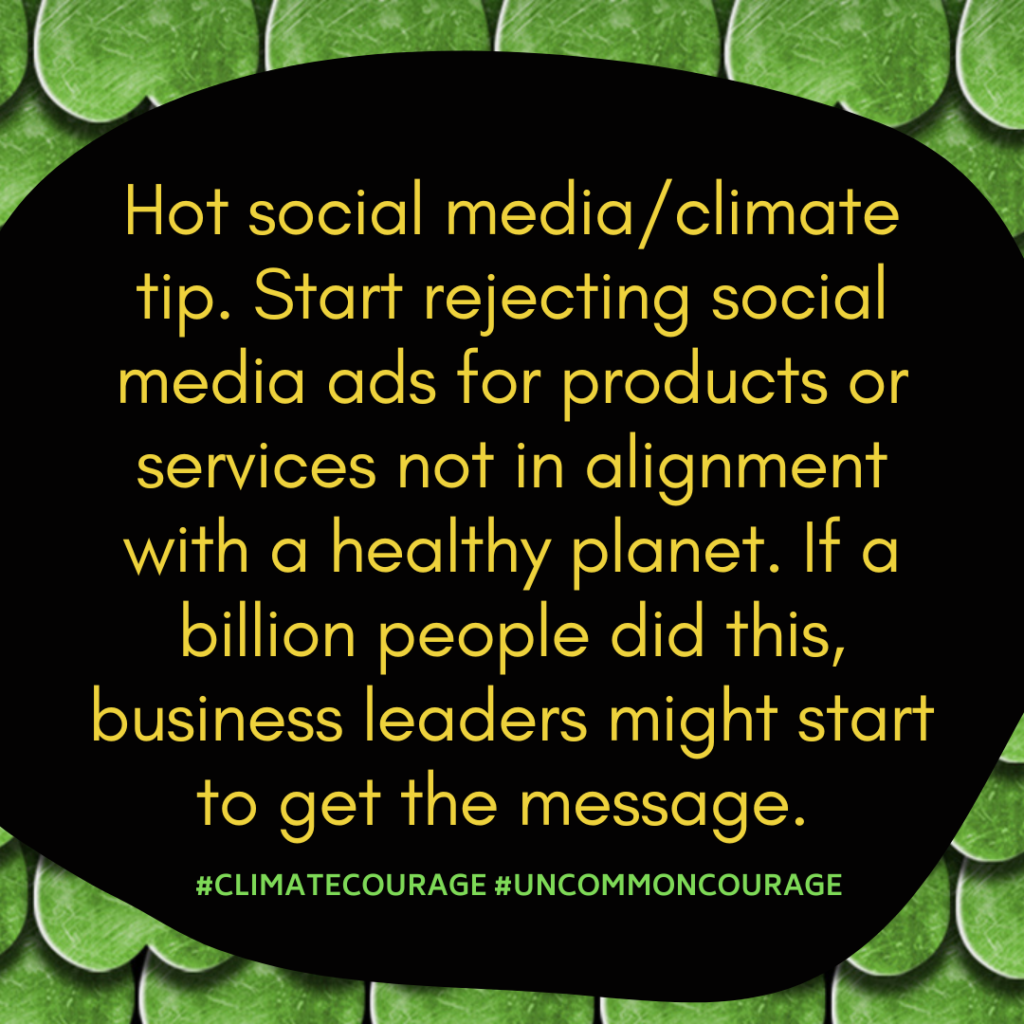
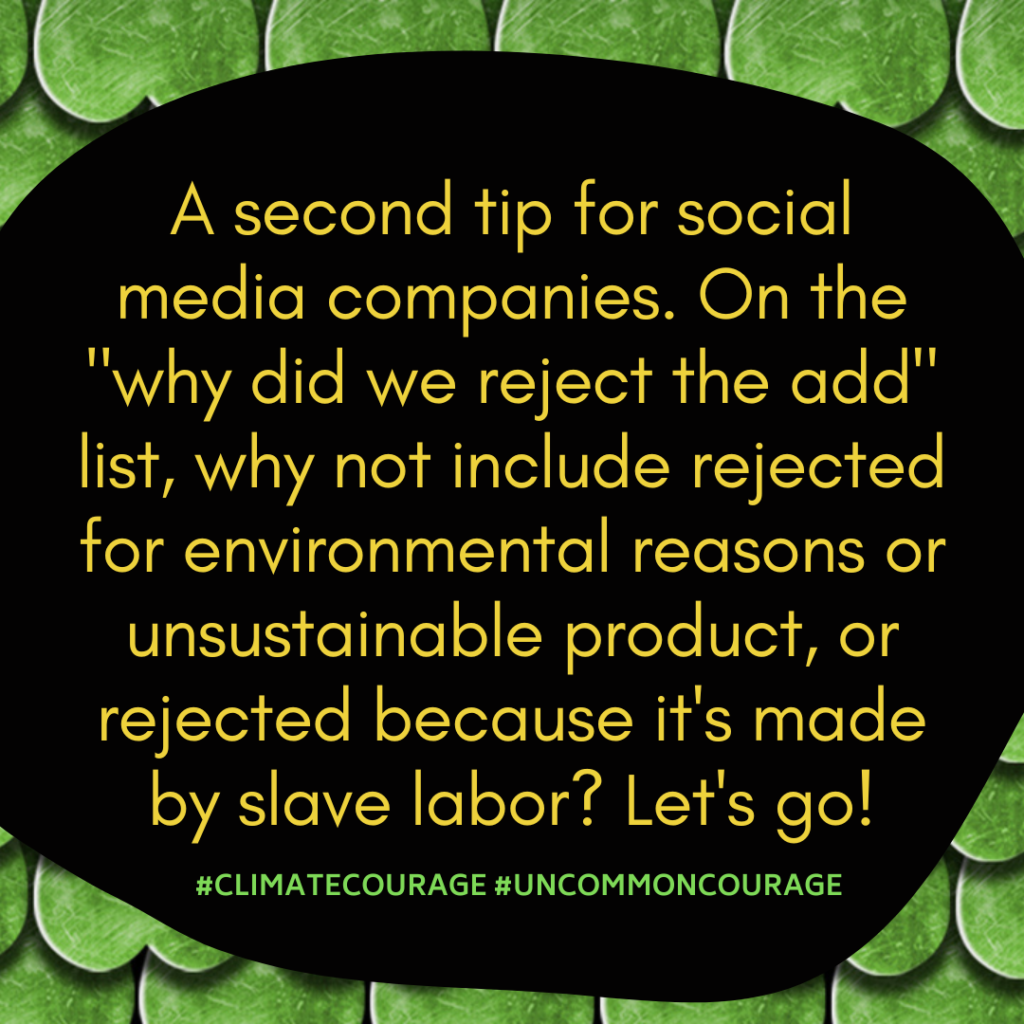
- Xeriscape your yard. Huge lawns use a lot of water to maintain. Drought-tolerant plants reduce your water consumption by 50-75%. Tip by Curbed.com
- Reforestation is the most cost-effective way to prevent global warming. Invest in planting trees with organizations like One Tree Planted, Trees for the Future, Tree Aid or B1G1 – Source: American Association for the Advancement of Science
- Mind the gap! Check all the seals on your windows and doors to make sure you don’t have leaks. If you invest in sealing them properly, you will be rewarded on your electricity bill!
- Support charities that educate girls, who are disproportionately impacted by climate change. Education is key to helping 49.58% of the world handle the impacts of climate and be agents of positive change.
- Use an online tool, like the one from carbonfootprint.com,to calculate and track your carbon footprint and then look at ways to reduce the biggest contributors.
- 90% of the power a washing machine uses is to heat the water. Set your machine to cold and you’ll not only save power and money, it’s actually kinder to your clothes.
- The best way to wash a car is at a self-serve station where customers use a coin-operated spray device; these stations use around 12 to 18 gallons of water per vehicle, compared to up to 100 gallons at home. Curbed.com
- Vote like your future depends on it, because it does. Anyone denying the climate emergency is denying our future. Make your vote count.
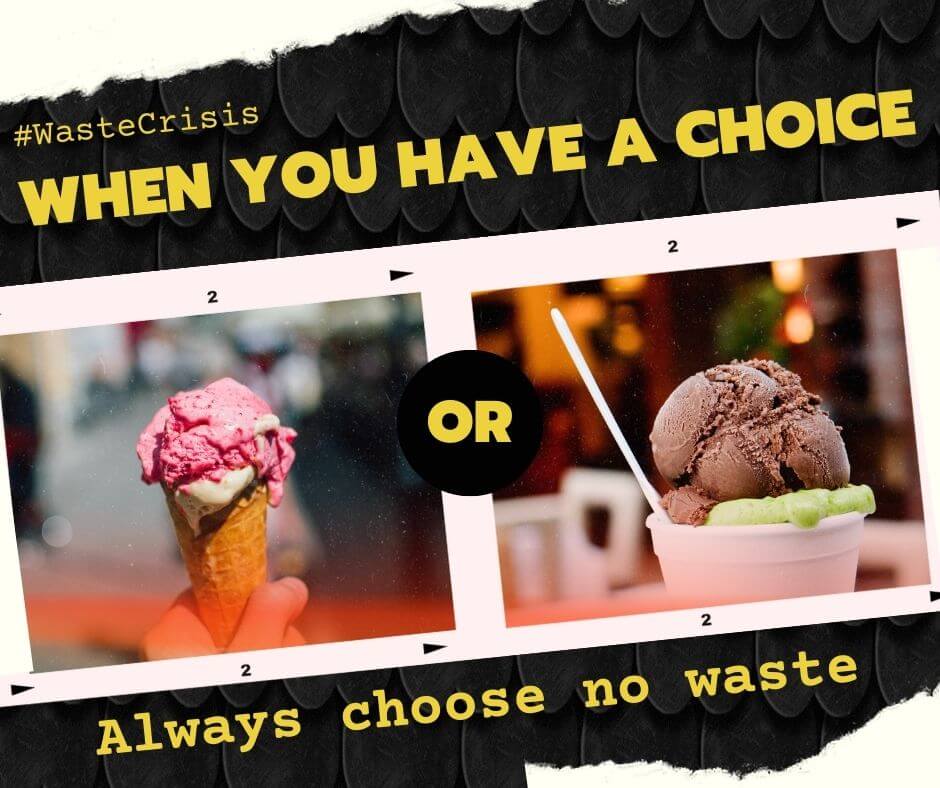
- 1/3 of all food globally is wasted. That’s enough food to feed every single person on this planet. Buy only what you need. Eschew the buffet. Compost scraps and leftovers so they don’t end up in landfills. Did you know 60% of landfills and rubbish dumps contain organic waste? We can do better. Compost!!
- If we reduce food waste, it will prevent 7.41 million tons of greenhouse gas (methane) emissions every year—a reduction of 6 to 8% of total greenhouse gas emissions. Methane reduction is critical in the climate fight – short term win.
- If food waste is unavoidable, work with a food rescue organization like Scholars of Sustenance (SOS), The Lost Food Project or organizations like Divert for Second Life, and the food bank. Google food rescue and see who is active in your community.
- Keep a wheelie rubbish bin for recycling close to your sink. Now let staring at that bin give you an extra push to wash rubbish out and recycle it instead of tossing it in the trash. Make it easy to build new habits.
- The dairy industry is a major contributor to greenhouse-gas emissions. Cut it out or choose alternatives whenever you can.
- Sign up for advocate training through www.climaterealityproject.org
- Re-watch An Inconvenient Truth. You may have seen Al Gore’s climate change documentary years ago, but in many ways, its message has never been more urgent. Host a viewing party for the sequel, An Inconvenient Sequel: Truth to Power.
Where we were in 2022
Top 10 sustainable travel tips according to Euronews
#1 | Flying less and staying longer is the simplest and most effective way to reduce your holiday carbon.
#2 | Swap planes for trains when in Europe where good connections link many holiday destinations. A train from London to Madrid emits approximately 174% less CO2 than flying.
#3 | Human-powered exploration is emissions-free and good for you! Walking, cycling or kayaking can also help you to better connect with local people. Opt for an electric bike if you need a boost.
#4 | Go electric. Some lodges in places like SA’s Kruger National Park or Kenya’s Ol Pejeta Reserve offer electric safari vehicles. These have the added benefit of being lower-emission, quieter and less disruptive to wildlife.
#5 | Watch your ‘Foodprint’. Eating local limits how far your food travels before it hits your plate. Seek out Farmers’ Markets and restaurants serving fresh, locally-sourced produce.
#6 | If you want to go one step further, eating a plant-based diet while you travel can reduce your personal footprint by up to 73 %.
#7 | Some major airlines including BA and KLM have recently allowed passengers to fund the use of sustainable aviation fuel (SAF). Mixed in a 50% ratio with standard fuel, SAFs may lower flight emissions by up to 80%.
#8 | The WTTC estimates tourism provides 319 million jobs globally. Smart travel protects forests from extractive industries, funds anti-poaching patrols, and helps establish marine and terrestrial reserves that preserve global biodiversity.
#9 | Saving the planet will need both reductions in carbon emissions and extensive rewilding. If you do choose to fly, look for nature-positive holidays which actively benefit wildlife and habitats, and pick trips that ensure the money you spend ends up in local hands.
#10 | Carbon offsets aren’t a solution to our climate crisis. Want to be a greener traveller? The truth is you’ll need to fly less and do more in your destination to reduce your carbon footprint. And when you do fly, make sure to make a positive difference.
Leave only ‘green’ footprints, take only memories. Set up an account with B1G1.org and offset your travel. B1G1 is trusted, meaningful and impactful. Source: euronews.travel
- Try doing meat-less Mondays at home or work. Don’t want to cook? Try Thai or Indian. If we can reduce meat by 75% we will make a difference.
- Want not, waste not! If we reduce food waste, it will prevent 7.41 million tons of greenhouse gas emissions every year—a reduction of 6 to 8% of the total greenhouse gas emissions.
- The Great Fridge Hack from Tim Wade. Create a “must be eaten soon” drawer by placing a container in a highly visible spot in the fridge. Each day, fill it with food close to expiring and use it for your next meal.
- Contribute to your company’s sustainability projects and goals. If there aren’t any yet, find like-minded colleagues and get started. Here’s some articles on the growing opportunity. Read this one, this one, and this one.
- Can’t adult without coffee? Buy coffee machines that use beans or powder and don’t contribute to the coffee pod waste explosion. Next, buy in bulk to reduce packaging or from somewhere you can use your own container. Finally, put coffee waste in your garden, your plants will love it!
- Lose the lid! A simple act to reduce single-use plastic: say, “no thank you” to the lid on your takeaway coffee. Better still, bring your own mug, or sit down and enjoy your coffee in the cafe! Pro tip: don’t drive with a hot coffee and no lid…
- Put your grounds on the ground! There is a great example using coffee pulp for regeneration in Costa Rica on degraded lands that regenerated in just two years. Imagine the impact if we did this on a global scale – through our collective power of restaurants and individuals – we could make a huge impact on reforestation.
10 EASY ways to reduce our water consumption
Because by 2025, two-thirds of the planet will run short of fresh drinking water, according to healtheplanet.com. By 2050, more than 75% of the world could face drought, UN Report. And here’s a report from 2023 that the world is running out of water.
- Turn the tap off when brushing your teeth.
- Spend less than 5 minutes in the shower.
- Repair leaks Immediately.
- Install low-flow showerheads and toilets.
- Use a front-loading washing machine and run it only when full.
- Use a toilet tank displacement device (like a glass jar filled with water) to reduce the volume of water in the tank.
- Use drip irrigation for lawns and gardens
- Replace grass with shrubs and ground cover that require less water.
- Water lawns in the early morning or late at night to prevent evaporation.
- Harvest rainwater as an efficient way to water your garden.
Save water. Let’s all commit to less waste in all areas of our life.
- It’s really important to remember this distinction. The climate emergency is not about saving the earth. She’ll heat up, cool down, push our pollution into her stratigraphy and regenerate, creating new life. No, we are fighting for our ability to live on this earth in a stable environment that allows us to flourish. We are getting very close to the edge now. Please, join the fight.
- According to the UN Global Assessment Report: climate change impacts plus poor risk management converged to drive recorded yearly disasters up to 350-500 in the last two decades, 5x higher than 50 years ago. This includes fires, floods, pandemics and chemical accidents. The projection is 560 a year by 2030 or 1.5x per day, putting millions of lives at risk. We must get prepared!
- “Throughout history, schools and teachers have evolved to tackle many of the problems facing human society. The climate emergency is surely the biggest problem of them all. It’s time for education to pivot again. The final aim of education should be flourishing: human flourishing of current and future generations and flourishing of all living on earth,” Olli-Pekka Heinonen, International Baccalaureate.
- NIMBY is an acronym for the phrase “not in my back yard.” It’s the opposition by residents to something perceived as unpleasant or hazardous in the area where they live, especially when they raise no objections to similar developments elsewhere. Think Nuclear power plants, wind and solar farms. An issue in the fight for the climate.
Don’t throw out plastic bottle caps
- 1.5 vs 2C warming – what’s the difference? At 1.5C we will lose 70-90% of coral reefs. At 2C it’s 99%. Extreme heat will impact 14% of the global population every one in five years, at 2C it’s 37%. That’s 2.6x worse if we move from 1.5-2C. We don’t want to do that. Let’s do all we can to turn this around. Source: Climate Council Australia
- Water is the bloodstream of the biosphere. But we are profoundly changing the water cycle. This is now affecting the health of the entire planet. Source: Stockholm Resilience Centre.
- Global banks form a group to decarbonize aviation, yet continue to invest in fossil fuels. The Bank of America, Citigroup and Wells Fargo vote to keep financing fossil fuels, rejecting shareholder resolutions to make their lending practices consistent with climate targets. Give with one, take with the other. Business as usual is not a solution to this crisis.
- It’s really important to remember this distinction. The climate emergency is not about saving the earth. She’ll heat up, cool down, push our pollution into her stratigraphy and regenerate, creating new life. No, we are fighting for our ability to live on this earth in a stable environment that allows us to flourish. We are getting very close to the edge now. Please, join the fight.
- According to the UN Global Assessment Report: climate change impacts plus poor risk management converged to drive recorded yearly disasters up to 350-500 in the last two decades, 5x higher than 50 years ago. This includes fires, floods, pandemics and chemical accidents. The projection is 560 a year by 2030 or 1.5x per day, putting millions of lives at risk. We must get prepared!
The Unsustainable Truth: is this the answer to the fossil fuel dilemma?
- We cannot get ourselves out of this crisis by replacing everything we have now with sustainable options. We will still be mega consumers if we do. We must focus on shrinking our lifestyles in every way we can. Cars, food, clothes, technology, travel, you name it, we need less, less, less! Are you actively shrinking your impact?
- Are you in a position to join a growing movement of professionals, all around the world, who are so concerned about the future of our environment, they’ve quit their jobs to focus 100% on the climate emergency?
- According to Reclaim Finance, the world’s largest global asset managers are still investing $82 billion in companies developing new coal projects and $468 billion in 12 major oil and gas companies. It’s time to leave it in the ground. Are you investing with these companies? Are you protesting? #JustStopOil
- Dear friends, I’m committed to doing my part to reduce my impact on the environment. One commitment is to unsubscribe from emails I don’t read. Please don’t take offence, but as you know, I’m not reading yours anyway, which means I’m just a number on an email list. So when you see me unsubscribing, that’s why. I’ll support you on social media, promise.
- We turn it up, turn it down, turn it off, or whatever action is needed to save energy. It’s time to educate ourselves on all forms of energy, and while it’s hard to appreciate our individual action makes any difference, we get the bigger message of collective impact. We encourage our friends and families to do the same.
- Education – Solastalgia describes the unique mental anguish caused by living with the experience of negative environmental change. Created by Australian environmental philosopher Glenn Albrecht in the early 2000s, he based it on the words solace (that which gives comfort) and algos (for pain). Source: Verywellmind. Do you feel it?
- Get yourself a climate clock. Launched in 2020, it counts down the critical time window to reach zero emissions (the “Deadline”), while tracking progress on key solution pathways (“Lifelines”). Put it up at school, work, home, in your city, everywhere. We MUST #ActInTime. Source: climateclock.world
- According to UCL’s Centre for Biodiversity & Environment Research, climate change and habitat loss is triggering a global collapse in insect numbers. The majority of the world’s estimated 5.5 million insect species are thought to live in the tropics – an understudied area – where the greatest abundance of insect life may be suffering a calamitous collapse without us even realising. It is time for all of us to be aware so we can ACT!
- Everything we buy, everything that comes into our homes, we must think – what is next for it? How can it be used for its purpose and after that, what function can it serve? If it has no purpose, don’t buy it. If it can become something useful, make sure it does. We must destroy the throw-away culture we have created. The last place our purchases should go is in the rubbish.
- Hey! Email marketers: The average email campaign open rate is 15-25%, click-throughs just 2.5%, according to Campaign Monitor. That’s a lot of unnecessary emissions released with up to 85% of your audience not interacting. You know that 65 emails emit the same carbon as driving a car one kilometre, right? Let’s stop glamourising the size of email marketing lists and remove “subscribers” not interacting. This is a change that can have a punch.
- Dear GenZ and Millennials, a GenX here. We won’t have more voting power than our parents (the Boomers) until 2028. The Boomers aren’t bad, they just have different priorities. So please, register and vote, because your future depends on it. The power is in your hands – please, do not allow yourself to be disenfranchised! You are the hope.
- Mixed materials are really problematic for recycling. Pringles, for example, and other snacks that come in a tube, may be advertised as recyclable but it requires difficult technical capacity to split the paper, plastic and metal apart – so it’s rarely done in practice. Whenever the munchies strike, look for packaging made from a single material.
- The world has changed, and so should the discussion of emissions. The huge gap between high and low emitters suggests the current nation-centered approach to cutting carbon needs to be rethought. “We should put a little more effort on the top of the distribution, who concentrate a lot of the emissions, and who have not really been the focus of policies of the past decades.” — World Inequality Lab’s Lucas Chancel
- Buying local is something we can all be better at, versus going the “easy” path of supporting the big brands, but it’s more than that. Food flown from Japan or China or Australia, or wherever the other side of the world is for you, must be a thing of the past. We must reduce the steps between farm and table, because we now understand that the total emissions of what we eat needs to be factored into our buying decisions.
- Climate Dad – only a society that has truly lost its way would celebrate holidays and festivals by purchasing instant-landfill from planet-devouring corporations and then pass it on to beloved family and friends. Let’s uncouple consumer capitalism from the meaningful people and moments in our lives. Twitter @ClimateDad77
- As incomes rise, diets diversify and meat consumption rises. We need a second earth if we all ate like Aussies or the British. According to the USDA, the average American ate 53 pounds of beef in 2019 —the most carbon intensive meat. The bigger challenge: a growing middle class in developing countries from China to South Africa eating more meat than ever. We’ve got to address this urgently. Our forests are being destroyed for meat.
- Since the very first Earth Day April 22nd 1970, the population abundance of mammals, birds, reptiles, amphibians and fish has decreased by, on average, 60%. The way we feed, fuel and finance our societies and economies is pushing nature, as well as the services that power and sustain us, to the brink. Source: WWF. Let’s make THIS Earth Day count. Time for action.
- “Yes, you can recycle Tetra Paks! While it doesn’t look like a great option due to the many components and the waxy bits, it can be recycled along with cardboard and paper. To add it to paper and cardboard recycling, just cut off the plastic lid and anchor, wash it out, and then flatten or cut them open. The plastic can be recycled too.” Michelle Mouille, Sustainable MaiKhao Foundation
- Feeling ashamed of ourselves, or shaming others is not going to help us achieve massive change. It’s impossible to be perfect right now and we have to work SO MUCH harder to avoid the unsustainable choices on offer. All we can do is our best. Oh, and always remember to share the changes you’re making with your community to inspire others. It works, I promise!
- Did you know the world’s wealthiest individuals—the top 0.001%—release emissions equivalent to nations? This is profound. Think Musk, Bezos and Branson with their space missions. These individuals and how they live, mean their decisions have the same climate impact as nationwide policy interventions. Incredible, huh? Source: World Inequality Lab’s. PS: doesn’t mean we don’t do our part. It’s all-in! But they must change in ALL ways.
- According to UN Women: Countries with higher percentages of women in parliament adopt stricter climate change policies, resulting in lower emissions. Locally, women’s participation in managing natural resources leads to more equitable and inclusive resource governance and better conservation outcomes. Hot tip: Equality is critical for our future. Give women a seat at the table – your future is on the line too.
- The Jump Campaign asks us to buy no more than three new items of clothing per year. I can hear the fashionistas screeching, but this is what’s required if we have any chance! Can you do it? Swap clothes with your community, buy second hand, get your sewing skills upgraded? Don’t forget to donate old clothes or cut up for wrapping presents, use as cleaning cloths, and more. They key thing is massive reduction in our consumption habits. Check out this fast fashion story – we’re supporting that!
- Check this out. This is the volume of data or information created, captured, copied, and consumed worldwide from 2010 and estimated up to 2025, according to Statista! Data consumes energy, energy creates emissions. Time to clean up our digital data – photos, videos, PowerPoints, and all big files we have on our devices. Delete, delete, delete.
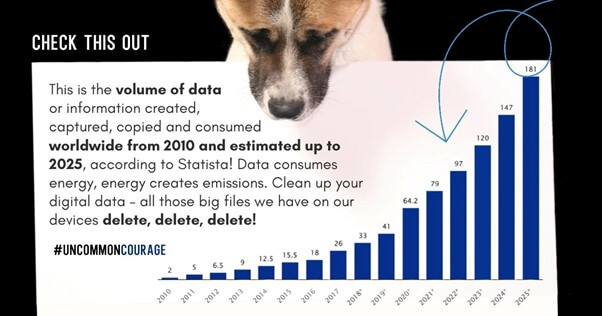
- The higher your income, the higher your emissions. Sales of the single-most polluting asset, a superyacht, increased by 77% in 2021, while billions of people starved. Oh, and a ride to space? It releases more carbon per passenger than the lifetime emissions of any one of the world’s poorest billion people. All for a ride 11 minutes long…our priorities are pretty screwed huh? Source: World Inequality Lab’s. Read this article in Bloomberg to understand wealth and emissions.
- If wealthy people or the top 10% (salary of $38,000 according to Oxfam) make six straightforward lifestyle changes, we could rein in runaway consumption that is partially driving the climate crisis. “This ends once and for all the debate about whether citizens can have a role in protecting our earth. We don’t have time to wait for one group to act, we need ‘all action from all actors now’.” Tom Bailey, co-founder of takethejump.org
- The top 1% of emitters (salary of $109K+ ref Oxfam) are responsible for 21% of emissions growth since 1990. In fact, to even out carbon footprints in the U.S., its top emitters would have to cut pollution by 87% by 2030 while the bottom half could actually increase theirs by 3%. Source: World Inequality Lab’s
- This emergency requires ‘all-in.’ We all must start to do everything we can to make a bigger collective impact. It’s not someone else’s responsibility, it’s all of our responsibility. Don’t blame “them” – government, business, media, the 1%, the .001%. Any of us who live out of balance with earth need to address our impact and encourage our community to do the same.
- “We believe optimism is a form of courage. We believe that a billion acts of courage can spark a brighter tomorrow. A green and peaceful future is our quest. The heroes of our story are all of us who believe that A better world is not only within reach, but being built today.” Greenpeace
- Would you give up burgers, steak and all leather goods for one year, as a form of protest to stop the three major meat companies linked to deforestation of the Amazon Rainforests? Those three companies are JBS, Marfrif and Minerva. Let’s take a stand together.
- In the UK, two of every 10 pounds invested in an average pension is driving forest loss. Is your pension fund contributing to deforestation? One of the most effective things we can all do is green our pensions, which is a significant way to reduce our personal carbon footprint. Have you checked what your pension fund is investing in? Source: Global Canopy and Systemiq
- Education – Scope 1 covers direct emissions from owned or controlled sources. Scope 2 covers indirect emissions from the generation of purchased electricity, steam, heating and cooling consumed by the reporting company. Scope 3 includes all other indirect emissions that occur in a company’s value chain. Scope 3 is the really challenging one. Supply chains are messy. Source: Carbon Trust
- Sending 65 emails emits the same carbon as driving a car one kilometer. According to Billiontrees.com we send 300 billion emails per day. The energy used to send these emails is the equivalent of burning two billion gallons of fossil fuels every year. This is a simple way we can make a difference. Clean up your email. Don’t store – delete. Send less. Avoid sending to multiple people. Unsubscribe. Attachments, graphics add to emissions. Text is better.
- Lobby your council and governments to invest in clean public transport that makes it easy and desirable for the community to jump on board. Fight this fight. Governments sold many of these assets off decades ago. We need it back and it must be affordable. Electric cars are not going to get us out of this mess.
- One-tenth of all flights departing from France in 2019 were on private aircraft. In just four hours, those individually-owned planes generate as much carbon dioxide as an average person in the European Union emits all year. Four-fifths of people on the planet never get on an airplane in their entire lifetime. Source: Boeing. Time to call this out, no? Airport protests perhaps?
- Plant for our pollinators. Better yet, rip up that perfect lawn and plant a garden, including plenty of plants for your local pollinators. Not the right time of year to plant? Book an appointment in your calendar and do it when the time is right.
- “We no longer live in a stable climate. The instability is worsening quickly. This should terrify everyone alive. And it was all brought to you by the fossil fuel industry, which has known for decades, and did what it could to stop any action.” – Peter Kalmus, @ClimateHuman
- “Evidence suggests that women will bear the brunt of negative health outcomes linked to the #ClimateCrisis. This is why it is critical to build gender equality along with sustainability to drive better environmental outcomes #ForPeopleForPlanet.” Source: UN Women. If we want to overcome the challenges ahead, we need 50/50 representation. Our future hangs on it.
- Scientists estimate that 150-200 species of plant, insect, bird and mammal are already becoming extinct every 24 hours, indicating a sixth mass extinction is underway. Losing the Arctic sea ice will intensify this already precarious situation. We must act NOW!
- People who can cross over multiple topics and make sense of intersecting ideas, seeing opposite views and bringing the bigger story together, are not valued in our societies – business, politics, etc.. Too intimidating? We need experts who go deep, but we also need big picture thinkers who go wide and bring all the threads together. Both are valuable, only one is valued. Let’s change that. The climate crisis needs these thinkers.
- Capitalism is killing the planet – “While you might persuade yourself that you are a green mega-consumer, in reality you are just a mega-consumer.” … “We will endure only if we cease to consent,”… “We need to understand history’s most important lesson. Our survival depends on disobedience.” George Monbiot.
- If you have the capacity, organize and take the biggest polluters to court and sue them for not providing a live-able environment for future generations. Recruit your community to support you and get going. Legal cases are and will continue to be a big part of the climate fight.
- The agricultural sector is the 2nd largest contributor to emissions after fossil fuels. It’s also the leading cause of deforestation, water and air pollution, biodiversity loss and more. Want to make a difference? To lessen our impact, eat a plant-based diet, or go full vegan, and avoid leather. Start experimenting.
- Avoid climate doom – it’s bad science and bad for climate action. When we believe we cannot change our circumstances, we become demotivated and enter the “learned helplessness” state. This is the opposite of the energetic advocacy the climate crisis demands. Deniers benefit from this. Don’t let them win.
- Work out how you can reduce your personal fossil fuel use – what energy powers your home? Can you reduce your time on the road? Can you reduce travel? Can you use clean public transport? Carpool with your community?
- Every conversation you have, every event you attend, every article you share, every action you take matters. Believe it and don’t spend another minute thinking what you do makes no difference.
- Love your rot – if its organic, compost it. Our landfills contain 60% organic material, which releases methane. Methane “sets the pace for warming” in the short term, because it’s a more potent greenhouse gas than CO2, even though it only lasts a decade in the atmosphere. We can take responsibility for our methane impact by composting our organic waste.
- Identify a local environment issue in your immediate community and get to work on solving it, bringing people on board to help. Community is critical in this fight. Don’t go it alone.
- Don’t fight the “inactivists” or deniers. They are a small group today and while they have an outsized presence on social media, we are bigger. That’s why we need to speak up more, to drown them out. Ignore anyone who is denying the reality before our eyes and focus on those who are committed to making a difference.
- Support indigenous voices and those who have been on the front line of the fight for a very long time. Every time you support someone who has been working hard – regardless of the crap they’ve had to endure – you will help them keep going. We need them to keep going.
- Search which brands are contributing to deforestation. Coach, LVMH, Prada, H&M, Zara, Adidas, Nike, New Balance, Teva, UGG and Fendi, have all been found to have multiple connections to deforestation. Do the work so you know you’re supporting brands doing good.
- It is time to vote only for leaders who are committed to acting on the climate emergency. We can afford no more deniers in government positions, especially leadership. Time is of the essence. We can tolerate no more fools in power.
- Plant a garden and grow your own food. If you live in an apartment, set up a communal vegetable garden, or at least grow your own herbs indoors so we reduce the plastic packaging from buying herbs in supermarkets.
- To change our future, we reject overconsumption, and actively choose what we buy, where we bank, what we invest in (or divest), how we travel, whether we have children, the energy we use in our homes, our recycling and composting habits, we say no to plastic, say no to all single use items, we support local businesses, we install solar if we can, we electrify, we conserve energy, conserve water, we waste less. We live sustainably. We live consciously.
- Take care of your mental health. What’s happening is alarming and overwhelming, because once you face this crisis, you know how bad it really is. Step back, rest, sink into the despair sometimes but don’t resist it (because it lasts longer) and when you’re ready, come back fighting. You can’t avoid eco-anxiety. You can only manage how you deal with it. Get professional help if you need it.
- Join a local, national, regional or global climate movement and get involved in every way you can. Support the work, show up at protests, donate if you can, share the content on social media.
- Commit to making one big change in your life. Make it the sort that will surprise your community like riding your bike everywhere, no more flying, living a zero waste life, planting a community garden, or going vegan. Don’t forget to tell everyone you know and inspire them.
- What is your passion in our environment? What do you love or what is something intrinsically tied to beautiful childhood memories? Go and save that!
- Actively and financially support the media tackling the climate crisis. We need their voice in the world to ensure we’re getting the truth about this crisis. They need funding to keep paying for high integrity journalism.
- Keep an eye on the #WhoMadeMyClothes movement. Dig deep and know the impact of who you’re buying from. Don’t support businesses that are destroying the environment and are not supporting the humans in their supply chain. Demand dignity for all life on earth.
- Our greatest power is our ability to influence our local communities – because they trust us. Understand the opportunity we all have to create ripples and watch it make a massive difference. Ignore those who don’t want to get involved, focus on those who do.
- Search – End Slavery Now – and understand we have more human slaves today than at any time in human history. Time to end this barbaric trade, as we transform the global economy with respect for all life at the center of how we design our world.
- Talk about the climate crisis every chance you get, everywhere you show up. You will be amazed how many people are not aware of what’s going on.
Cheers
Andrea
Want to get in touch?
All of my contact information is here on Linktree.
Environment education
Four environment resources to help you navigate this challenging territory.
- Knowledge, constantly updating
- Individual action and awareness, so we do our part
- Resources for those struggling with eco-anxiety. Please share with your community.
- Finally, more than 100 mini-videos on many topics regarding the multiple crisis’ we face. Feel free to download and use as your own. No credit necessary.
Uncommon Courage: an invitation
Uncommon Courage is an invitation to be your courageous best self every day. It’s also an antidote to the overwhelm, fear, and rage rolling around the world. But it’s more than a book; it’s an invitation to join an inclusive community that wants to better understand humanities challenges – both global and personal – in order to take courageous action and create a better world for everyone. If Covid19 has given us the time and space to reflect, Uncommon Courage gives us the nudge we need to create lasting change.
You can buy it on Amazon, Apple Books, Barnes & Noble, Book Depository, Booktopia, Smashwords, Kobo, Gardners, Odilo, Indie Bound, BookShop by BookTrib and Scribd.
Better yet, order it from your local bookstore, so you can #SupportLocal.
You can read the reviews, including a new five-star review on Book Commentary, another five-star review on ReaderViews, a review on BookTrib, and three more on Booklife, another on Book Commentary and Blue Ink Reviews. I’m also collating reviews on my Website too. Have a look and grateful to everyone who has written or recorded one.
Come and join the conversation in my Facebook Group Uncommon Courage.
Listen in to the Uncommon Courage, the podcast on Apple, Spotify and everywhere podcasts are published.
18 Steps to an All-Star LinkedIn Profile
Listed by Book Authority in the 100 Best LinkedIn Books of All Time and 22 Best New LinkedIn eBooks To Read In 2021 and 2022 categories. Grab it today if you want to take your professional presence to the next level! When it comes to LinkedIn, it really is time to ask — can you really afford not to have this book in the hands of every employee?
Are you a Social CEO? The Social CEO: How Social Media Can Make You A Stronger Leader.
Want to claim your stage? Unleash Your Voice – Powerful Public Speaking for Every Woman
Feedback
Have I done a great job for you? Can you write a reference on my LinkedIn profile or on my Google Business page? If not for me, why not write one for someone else who inspires you or has helped you? Join the #GivingEconomy.

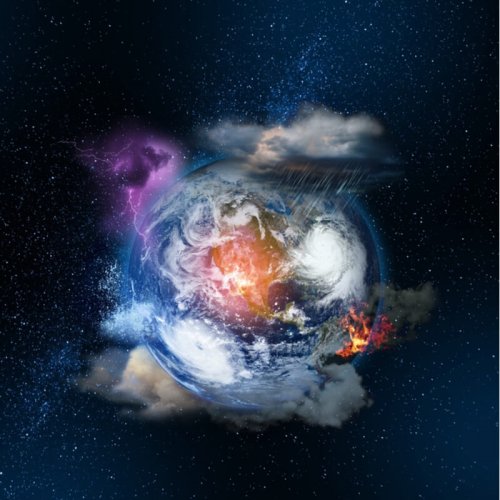


55 Responses